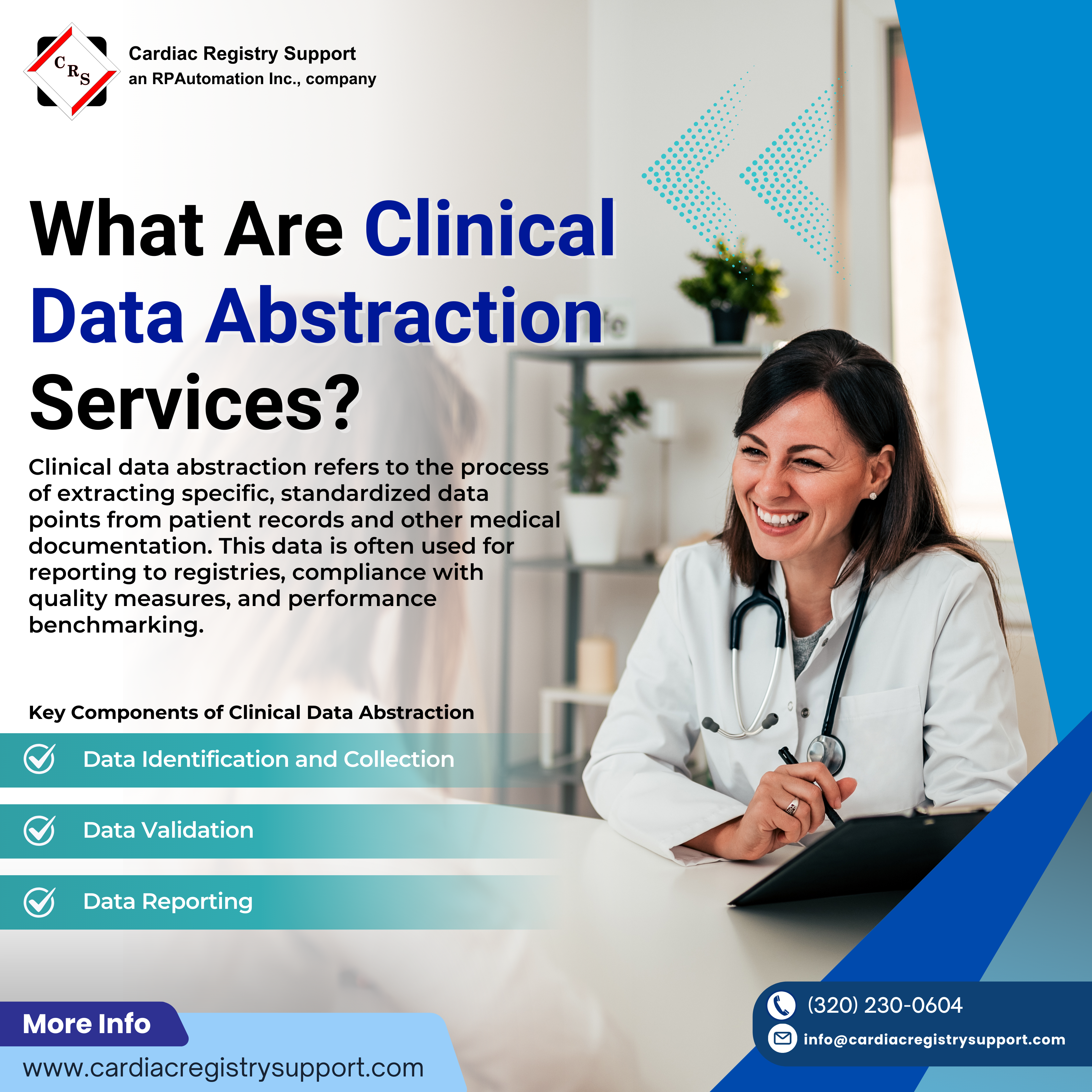In today’s healthcare landscape, the demand for high-quality, data-driven decision-making is crucial. Clinical data abstraction services play a pivotal role in transforming raw medical data into actionable insights. These services are critical for healthcare providers aiming to meet regulatory requirements, improve patient care, and optimize operational efficiency.
What Are Clinical Data Abstraction Services?
Clinical data abstraction refers to the process of extracting specific, standardized data points from patient records and other medical documentation. This data is often used for reporting to registries, compliance with quality measures, and performance benchmarking. The process typically involves trained professionals—known as clinical data abstractors—who review and extract relevant information from electronic health records (EHRs), medical charts, and other healthcare documentation.
Data abstraction services can be conducted manually by expert abstractors or through automated systems leveraging artificial intelligence and machine learning. Regardless of the method, the goal remains consistent: to ensure that healthcare organizations have accurate, complete, and meaningful data for analysis and reporting.
Key Components of Clinical Data Abstraction
- Data Identification and Collection
- Abstractors identify relevant data fields, such as diagnosis codes, procedure details, and demographic information, based on the organization’s objectives or registry requirements.
- Data Validation
- Ensuring the accuracy and reliability of extracted data is essential. Abstractors cross-reference data points to validate their completeness and correctness.
- Data Reporting
- Once the data is abstracted, it’s prepared for submission to registries, quality improvement programs, or internal performance dashboards.
The Importance of Clinical Data Abstraction Services
Clinical data abstraction services are crucial for a variety of reasons:
1. Regulatory Compliance
Healthcare providers are required to submit data to various regulatory bodies, such as the Centers for Medicare & Medicaid Services (CMS) and specialized registries like the American College of Cardiology’s National Cardiovascular Data Registry (ACC NCDR). Failing to meet these requirements can result in penalties or loss of accreditation. Clinical data abstraction ensures that all necessary data is accurately collected and submitted on time.
2. Participation in Clinical Registries
Participation in registries like the Get With The Guidelines® (GWTG) Stroke and Heart Failure programs or the Society of Thoracic Surgeons (STS) database is essential for benchmarking and quality improvement. These registries provide insights that help healthcare organizations improve patient outcomes and meet national standards of care.
3. Improving Patient Outcomes
Abstracted data allows healthcare providers to analyze trends, identify gaps in care, and implement evidence-based practices. For example, analyzing data from cardiac registry submissions can help identify opportunities for reducing readmissions or improving procedural outcomes.
4. Enhancing Operational Efficiency
Manual data abstraction can be time-consuming and resource-intensive. Outsourcing this task to specialized professionals or services can save time, reduce errors, and allow healthcare staff to focus on direct patient care.
5. Performance Benchmarking
Data abstraction services enable organizations to benchmark their performance against peers and national averages. This is particularly important for hospitals and clinics aiming to achieve or maintain certifications and accreditations.
Key Benefits of Outsourcing Clinical Data Abstraction
While some organizations choose to handle data abstraction in-house, outsourcing this function can provide numerous advantages:
- Expertise
- Professional abstractors are highly trained in data abstraction protocols and are well-versed in the requirements of various registries and quality programs.
- Scalability
- Outsourced services can scale to meet the needs of growing organizations or during periods of high demand.
- Cost Efficiency
- Outsourcing eliminates the need for hiring and training full-time staff, reducing overhead costs.
- Accuracy and Quality
- Specialized abstraction services have rigorous quality assurance processes, ensuring that the data is reliable and compliant.
- Faster Turnaround
- Dedicated abstraction teams often complete tasks faster than in-house staff, ensuring timely submissions to registries and regulatory bodies.
How to Choose a Clinical Data Abstraction Service Provider
Selecting the right provider is crucial for maximizing the benefits of clinical data abstraction. Here are some factors to consider:
- Experience and Expertise
- Look for providers with a proven track record in your specific area of need, such as cardiac registries or core measures abstraction.
- Compliance and Security
- Ensure that the provider adheres to HIPAA and other relevant data protection regulations.
- Customization
- The provider should be able to tailor their services to your organization’s unique requirements.
- Technology Integration
- Check if the provider offers advanced tools or integrates seamlessly with your existing EHR systems.
- Support and Communication
- Choose a provider that offers ongoing support and clear communication throughout the abstraction process.
Final Thoughts
Clinical data abstraction services are an indispensable part of modern healthcare operations. By leveraging these services, organizations can ensure compliance, improve patient outcomes, and enhance operational efficiency. Whether through in-house teams or outsourced providers, investing in accurate and reliable data abstraction is a critical step toward achieving excellence in healthcare delivery.
If you’re considering outsourcing your clinical data abstraction needs, reach out to a trusted provider who can help you navigate this complex but rewarding process. Your organization’s success in today’s data-driven healthcare environment may depend on it.


